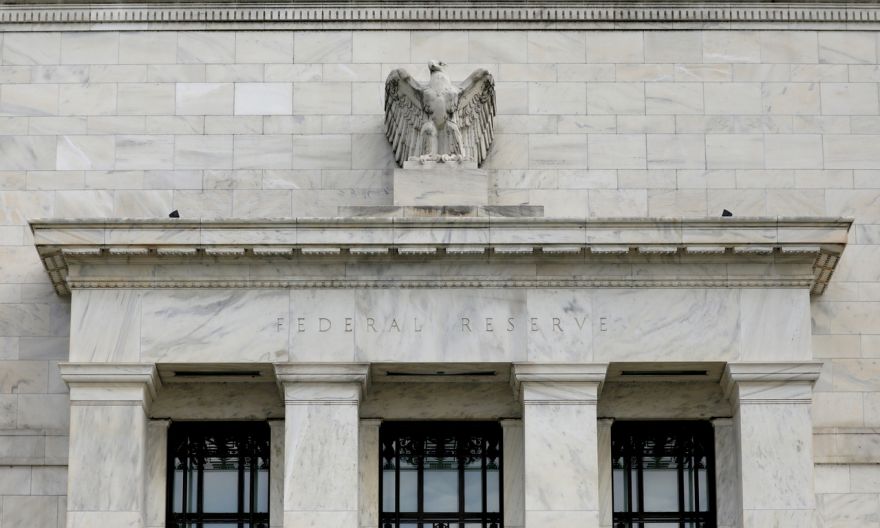United States Federal Reserve officials say tapering is near, advancing discussion on rate hike

NEW YORK (REUTERS) – Two Federal Reserve officials said on Monday that the United States economy is growing rapidly and that while the labour market still has room for improvement, inflation is already at a level that could satisfy one leg of a key test for the beginning of interest rate hikes.
Atlanta Federal Reserve Bank president Raphael Bostic said he is eyeing the fourth quarter for the start of a bond purchase taper but is open to an even earlier start if the job market keeps up its recent torrid pace of improvement. Moreover, he and Richmond Fed president Tom Barkin both said they believe inflation has already achieved the Fed’s 2 per cent threshold, according to their separate assessments. That is one of two requirements to be met before rate hikes can be considered.
Their remarks are a sign that as Fed officials hold discussions about how and when to taper their asset purchases, they are also getting more detailed in their debate about what it will take to satisfy the Fed’s inflation target under the new framework.
Dr Bostic, who has already pencilled in late next year for the start of rate hikes, pointed to the five-year annual average for the core personal consumption expenditures index, or core PCE inflation, which by his calculation reached 2 per cent in May.
“There are many reasons to think that we may be at that goal target right now,” Dr Bostic told reporters. But he said the committee has yet to agree on the metrics it will use to measure that progress, something policymakers will need to discuss.
Mr Barkin said high inflation seen this year may have satisfied one of the Fed’s benchmarks for raising rates, though there is still room for the job market to heal before rates should rise.
Under the Fed’s current policy guidance, rates will rise “when inflation hits 2 per cent, which I think you can argue it already has, and it looks like it is going to sustain there,” Mr Barkin said at the Roanoke Regional Chamber of Commerce in Virginia.
Their remarks echoed comments made by St Louis Fed president James Bullard last month, who said that the current pace of inflation, at 3.5 per cent annually by the Fed’s preferred measure, is well above the central bank’s 2 per cent target, and adequate in his view to make up for past weak inflation as required by the central bank’s new framework.
Labour market still behind
Under a new framework unveiled last year, Fed officials agreed to leave rates at near-zero levels until the labour market reaches maximum employment, and inflation averages 2 per cent, on track to moderately exceed 2 per cent for some time.
Policymakers said in December they would continue purchasing government bonds at the current pace of US$120 billion a month until there is “substantial further progress” towards the central bank’s goals for inflation and maximum employment.
With the elevated inflation levels reached during the pandemic, Dr Bostic said, the Fed has effectively achieved the “substantial further progress” goal for inflation.
More progress is still needed in the labour market, but that goal could be accomplished after another month or two of strong job improvement, Dr Bostic said. That puts the Fed on a path to begin trimming purchases between October and December, or sooner, if the gains this month are stronger than expected, he said.
Boston Fed president Eric Rosengren said on Monday during an interview with the Associated Press that the “substantial further progress” goal had been met for inflation, but that more improvement was needed in the labour market. He said the tapering standard for employment could potentially be met by next month.
“I would expect if we continue to have (jobs) reports like we’ve had over the last two, with very substantial payroll employment gains, that by the September meeting, we would, in my view, meet the substantial further progress criteria, and that would imply starting to taper sometime this fall,” Dr Rosengren said.
Mr Barkin did not specify a timeline for when the Fed may start to reduce its asset purchases, but said he is watching the employment-to-population ratio to evaluate whether the labour market has made enough progress toward the Fed’s goals.
In terms of how to structure the taper, Dr Bostic said he supports a “balanced” approach that reduces mortgage-backed securities and Treasury securities at the same rate. He also said he would be in favour of tapering asset purchases over a shorter period than what the Fed has previously done. “I am in favour of going relatively fast,” Dr Bostic said.
